|
|
|
Sort Order |
|
|
|
Items / Page
|
|
|
|
|
|
|
| Srl | Item |
| 1 |
ID:
154253
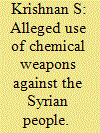

|
|
|
|
|
| Summary/Abstract |
The US has justified the use of military force against the Syrian regime under Bashar al-Assad, after its alleged use of chemical weapons against civilians. However, as long as the UN Security Council does not agree to intervention, unilateral American action is not permissible under the UN Charter. Even the principle of “responsibility to protect” is not justified in this case, as action would most likely be short, punitive and unlikely to end the attacks on Syrian civilians. The use of force rules, originating in customary international law and partially codified in the UN Charter, establish the lawful framework for the initiation of military activity by a government. Humanitarian intervention or a military campaign calculated to stop widespread attacks on a civilian population, including acts of genocide, other crimes against humanity and war crimes is also contested as it is not defined in the UN Charter, although many scholars and activists claim it is supported by the charter's central objective to defend human rights and fundamental freedoms.
|
|
|
|
|
|
|
|
|
|
|
|
|
|
|
|
| 2 |
ID:
123194
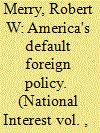

|
|
|
|
|
| Publication |
2013.
|
| Summary/Abstract |
PRESIDENT OBAMA'S June 13 decision to send light weapons and ammunition to Syrian rebels reflects a fundamental reality in the dialectic of American foreign policy. Within this administration and indeed throughout official Washington, humanitarian interventionism is the inevitable default position for policy makers and political insiders. There is no intellectual counterweight emanating from either party that poses a significant challenge to this powerful idea that America must act to salve the wounds of humanity wherever suffering is intense and prospects for a democratic emergence are even remotely promising.
|
|
|
|
|
|
|
|
|
|
|
|
|
|
|
|
| 3 |
ID:
111735
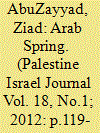

|
|
|
|
|
| Publication |
2012.
|
| Summary/Abstract |
The recent decision of the Arab League foreign ministers (Nov. 12, 2011) to suspend Syria's membership in the Arab League was interpreted by observers as the last act before international intervention in Syria; the same had happened earlier in Libya. But the Arab League's decision came after Syrian President Bashar al-Assad failed to understand the course of events in his country in light of what had happened in other rebelling Arab countries, leaving the Arab League countries with no option but to ask the Security Council to adopt the Arab initiative and impose sanctions against the Syrian regime. Such a decision by the Arab League in the past opened the door for NATO intervention in Libya and eventually may serve to allow outside intervention in Syria as well.
|
|
|
|
|
|
|
|
|
|
|
|
|
|
|
|
| 4 |
ID:
115584
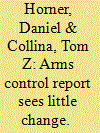

|
|
|
| 5 |
ID:
115084
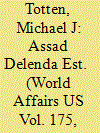

|
|
|
|
|
| Publication |
2012.
|
| Summary/Abstract |
Syria's tyrant Bashar al-Assad is in the middle of a life-or-death struggle. He might be overthrown. He should be.
The Arab Socialist Baath Party regime, beginning with its founder Hafez al-Assad and continuing through the rule of his son Bashar, is the deadliest state sponsor of terrorism in the Arab Middle East. It assisted the bloodthirsty insurgency in Iraq that killed American soldiers by the thousands and murdered Iraqi civilians by the tens of thousands. It has used both terrorism and conventional military power to place Lebanon under its boot since the mid-1970s. It made Syria into the logistics hub for Hezbollah, the best-equipped and most lethal non-state armed force in the world. It has waged a terrorist war against Israel and the peace process for decades, not only from Lebanon, but also from the West Bank and Gaza. And it is Iran's sole Arab ally and its bridge to the Mediterranean.
|
|
|
|
|
|
|
|
|
|
|
|
|
|
|
|
| 6 |
ID:
183289
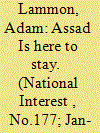

|
|
|
|
|
| Summary/Abstract |
A new U.S. policy that sees Syria readmitted into the regional fold is not intended to “reward” Bashar al-Assad for his barbarous behavior over the last decade, but for the United States to pick winners and losers in the Middle East.
|
|
|
|
|
|
|
|
|
|
|
|
|
|
|
|
| 7 |
ID:
123255
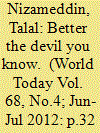

|
|
|
| 8 |
ID:
115479
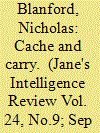

|
|
|
| 9 |
ID:
140325
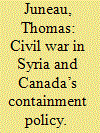

|
|
|
|
|
| Summary/Abstract |
The civil war in Syria has caused the deaths of more than 230,000 civilians and combatants, has led to one of the largest refugee crises in recent memory, and has destabilized the Levant. It therefore represents an extraordinarily challenging foreign policy conundrum. A wide variety of responses—ranging from the imposition of no-fly zones to doing nothing—have been considered in Ottawa and in allied capitals since 2011. Each one, however, raises potentially significant challenges.
This article explores how Canada has considered those alternatives. As is systematically the case for a non-great power, Canada’s policy options were shaped more by deliberations in allied capitals—especially Washington—and only thereafter by actual developments in Syria. After laying out Canada’s interests relative to the war in Syria, the article describes four policy alternatives that Canada has faced since 2011, as seen through the lenses of liberal pacifism, liberal interventionism, isolationism, and containment. Among this menu of deeply flawed options, containment has steadily emerged as Canada’s de facto approach. That approach has been correct: it is the least bad course of action available since it best allows Ottawa to protect and promote its interests. Nevertheless, Canada could take additional steps to implement a more comprehensive containment framework.
|
|
|
|
|
|
|
|
|
|
|
|
|
|
|
|
| 10 |
ID:
129317
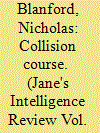

|
|
|
| 11 |
ID:
115078
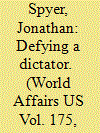

|
|
|
|
|
| Publication |
2012.
|
| Summary/Abstract |
The carnage in Syria continues and is intensifying as Bashar al-Assad's dictatorship pushes on in its countrywide effort to destroy the armed resistance against it. It appears increasingly likely that the struggle can only be settled by force. Either the dictator will crush the rebellion or the regime will fall. As a result, the rebel Free Syrian Army, as the armed element among the opposition, is playing an increasingly important role in the uprising. Yet who composes this group, and what does it stand for? How does it fit in the larger rebellion against Assad? And, perhaps most crucially, is it an appropriate recipient for Western aid in the near future?
|
|
|
|
|
|
|
|
|
|
|
|
|
|
|
|
| 12 |
ID:
127541
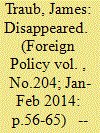

|
|
|
| 13 |
ID:
125291
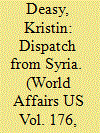

|
|
|
|
|
| Publication |
2013.
|
| Summary/Abstract |
ATMEH, Syria - A sprawling tent city has sprouted up here amid the sand-flecked hills and ancient olive groves. Giant tarps twist up into the branches as rivulets of contaminated water run below. A tank watches from down the road, which leads to the nearby Turkish border.
|
|
|
|
|
|
|
|
|
|
|
|
|
|
|
|
| 14 |
ID:
119758
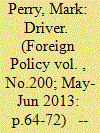

|
|
|
| 15 |
ID:
134010
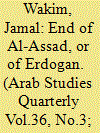

|
|
|
|
|
| Publication |
2014.
|
| Summary/Abstract |
In this article, I argue that Turkish Prime Minister Recep Tayyip Erdogan wanted to improve relations with Syria because he wanted Turkey to play a leading role in the Arab world. This role is promoted by the United States which aims at creating an alliance between Turkey and the Arab states to block Russia, China, and Iran from having access to the East Mediterranean or the Indian Ocean. Turkey's reward would be to have access to Arab markets and oil. Syrian President Bashar al-Assad was tempted by the United States, Turkey, and conservative Arab regimes to sever his ties with Iran, which he refused to do. Therefore, the former powers supported the Syrian uprising (which started as domestic protests against dictatorship, corruption, and misrule) to topple al-Assad. However, two and half years since the Syrian uprising started, the al-Assad regime seems to be resisting the attempts of his opponents to topple it, which would mean a failure of Erdogan in his political bet and might even lead to his downfall, especially after the eruption of protests against Erdogan throughout Turkey in early June 2013.
|
|
|
|
|
|
|
|
|
|
|
|
|
|
|
|
| 16 |
ID:
115399
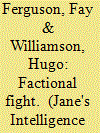

|
|
|
| 17 |
ID:
152592
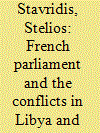

|
|
|
|
|
| Summary/Abstract |
The theory and practice of diplomacy has evolved greatly over the past few decades. Parliamentary diplomacy has become common practice, although there is an academic gap in its study, especially in the case of France. This essay aims to filling that gap: it shows how French parliamentarians have been active in foreign policy. First, they used the new concept of “responsibility to protect„ (R2P) in 2011 over Libya. Then, in the case of Syria, their main focus was on reacting to the 2013 use of chemical weapons by the Bashar al-Assad regime. Later still, after several Daesh terrorist attacks in Paris, they moved on to emphasize the right of “self-defense.”
|
|
|
|
|
|
|
|
|
|
|
|
|
|
|
|
| 18 |
ID:
129338
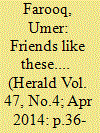

|
|
|
| 19 |
ID:
122118
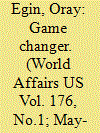

|
|
|
|
|
| Publication |
2013.
|
| Summary/Abstract |
Before Turkish Prime Minister Recep Tayyip Erdogan's government was reelected in July 2007, Erdogan made a calculated decision to shift his foreign-policy focus away from his NATO allies in Europe, where Turkey's European Union membership application had been long stalled. He cast his glance eastward, toward the Middle East, with the intention of establishing himself as the region's preeminent leader and positioning Turkey as the indispensible link between west and east. In April of that year, Erdogan visited Damascus, where he called upon Syria's president, Bashar al-Assad. By all accounts, the two leaders became fast friends. A few months later, the two vacationed together in Bodrum, a beautiful vacation hot spot on Turkey's Aegean Sea coast, where they were joined by their first ladies, Asma and Emine, who also appeared friendly.
|
|
|
|
|
|
|
|
|
|
|
|
|
|
|
|
| 20 |
ID:
193477
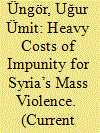

|
|
|
|
|
| Summary/Abstract |
After more than a decade of armed conflict in Syria, few perpetrators of mass violence have been held accountable for their actions. The Assad regime is the prime sponsor of impunity for these human rights abuses, but global and regional powers also bear responsibility for allowing the perpetuation of atrocities.
|
|
|
|
|
|
|
|
|
|
|
|
|
|
|
|
|
|
|
|
|